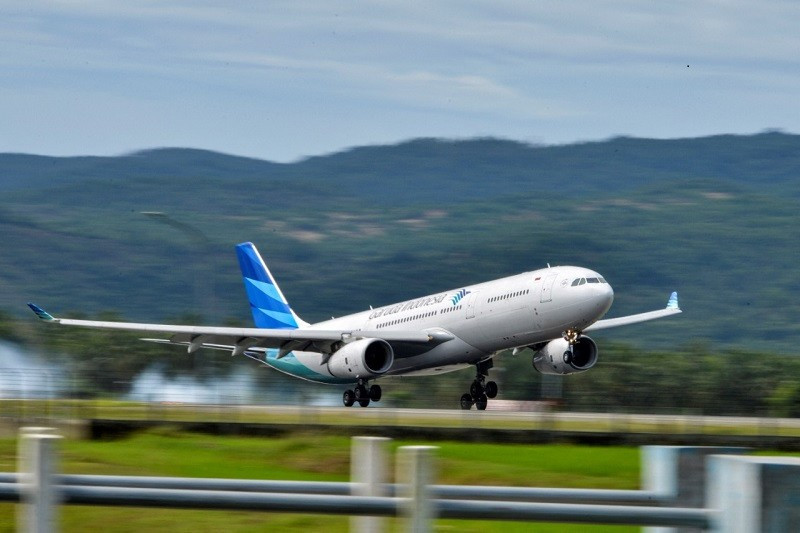News
Can Friendship Fly Garuda?
Tenggara Strategics October 30, 2025 Touching down: A Garuda Indonesia Airbus A330 lands at Sultan Iskandar Muda International Airport in Blang Bintang, Aceh, on July 13, 2021. (AFP/Chaideer Mahyuddin)
Touching down: A Garuda Indonesia Airbus A330 lands at Sultan Iskandar Muda International Airport in Blang Bintang, Aceh, on July 13, 2021. (AFP/Chaideer Mahyuddin)
The appointment of Gen. (ret) Glenny H. Kairupan as President Director and CEO of Indonesia's flag carrier Garuda Indonesia has stirred public debate about whether friendship can lift a troubled airline. Glenny, who took part in combat missions with President Prabowo Subianto , replaces another of Prabowo's close associates, Wamildan Tsani.
Despite having no prior experience managing large corporations or working in the aviation industry, Glenny is widely regarded as one of Prabowo's trusted confidants. His appointment has sparked concerns that Garuda's leadership change is less about restoring the airline's wings and more about rewarding loyalty within the president's inner circle.
Garuda's financial situation remains dire. As of June 2025, the airline reported short-term liabilities of US$1.3 billion, compared with only US$211 million in short-term assets, a glaring liquidity imbalance that underscores the company's ongoing financial distress. Total liabilities of Rp 133.2 trillion (US$8.1 billion) still exceed total assets of Rp 108.2 trillion, despite a Rp 6.65 trillion shareholder loan from Danantara state asset fund, part of a broader Rp 16.3 trillion financing package to support Garuda's maintenance, repair and overhaul operations. Yet the cash infusion has failed to ease Garuda's operational turbulence, forcing the company into yet another phase of restructuring.
Glenny's rise demonstrates how personal proximity to Prabowo continues to shape appointments within Indonesia's state-owned enterprises. Both he and Prabowo graduated from the Indonesian Military Academy (AKABRI) in the same era, Glenny in 1973, and their camaraderie dates to their cadet days. On his personal website, Prabowo recounted how Glenny courageously landed helicopters to evacuate wounded soldiers during operations in East Timor. Glenny also serves as a member of the Board of Trustees of Prabowo's Gerindra Party for the 2020–2025 term, underscoring his political alignment.
The move highlights a persistent challenge in Indonesia's governance landscape: the politicization of leadership in state-owned enterprises (BUMN). Such appointments signal a setback for meritocracy, as political ties increasingly outweigh professional credentials. Of the 652 commissioner and executive positions in state-owned firms, 165 are reportedly held by individuals affiliated with Gerindra. The blurring of lines between political loyalty and public service risks weakening institutional independence, eroding public trust and discouraging investment.
While Glenny's close relationship with the president may secure stronger government support for Garuda's recovery, his lack of experience in aviation and corporate restructuring raises doubts about his ability to lead a complex turnaround. A national carrier competing in volatile global markets requires leaders with proven technical, managerial and financial expertise, not merely political connections. To many observers, this appointment reinforces the perception that in Indonesia's state enterprise system, connections still trump competence.
To balance the leadership, the government as Garuda's majority shareholder as has appointed Thomas Sugiarto Oentoro as Glenny's deputy and Frans Dicky Tamara as commissioner. Both bring solid aviation experience and are expected to provide operational stability. The reshuffle also includes two international executives: Balagopal Kunduvara, formerly with Singapore Airlines, as finance and risk management director, and Neil Raymond Mills, a former transformation director at Scandinavian Airlines. Their inclusion offers a glimmer of hope for professional rigor and global expertise to guide Garuda's ongoing restructuring.
Ultimately, Garuda's fate under Glenny's leadership will depend on whether professional voices are empowered, or sidelined by political loyalty. If the airline becomes an extension of political influence rather than a commercially driven enterprise, Indonesia risks repeating the inefficiencies that have long plagued its state-owned sector.
Prabowo's decision to entrust one of Indonesia's most financially fragile companies to a personal ally exposes a broader governance dilemma. State-owned enterprises are not military units commanded by loyalty; they are complex commercial entities demanding technocratic leadership, fiscal discipline and strategic foresight. In a world where global airlines thrive on innovation, efficiency and service quality, Indonesia cannot afford to let political considerations outweigh professional merit.
Garuda's journey under Glenny will serve as a test case for whether Prabowo's administration truly values competence over connection. The outcome will determine not only the fate of a national icon but also the public's faith in the integrity of Indonesia's institutions.
What we've heard
A government source stated that the appointment of Glenny as President Director and CEO of Garuda is closely linked to the growing influence of the faction of retired military officers within Prabowo Subianto 's inner circle following the demonstrations in late August.

